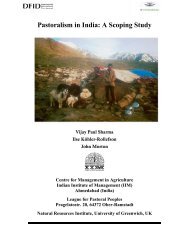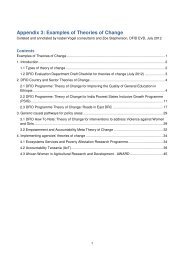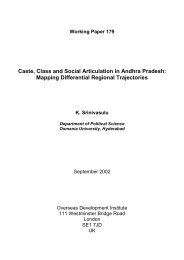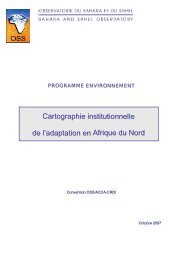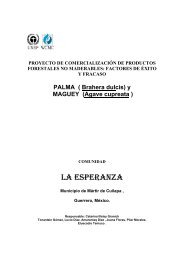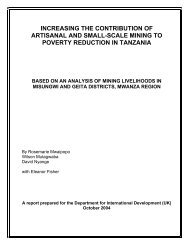Full Report - Research for Development - Department for ...
Full Report - Research for Development - Department for ...
Full Report - Research for Development - Department for ...
Create successful ePaper yourself
Turn your PDF publications into a flip-book with our unique Google optimized e-Paper software.
In general, no overall change of policy was reported. In only one study (Malaba et<br />
al., 2005) was it considered that the Zimbabwean government might have started<br />
recommending postpartum vitamin supplementation as a result of the study (not<br />
confirmed though). Audit was reported to be low cost and high impact (Dumont et<br />
al., 2005; Dumont et al., 2006).<br />
Kangaroo Mother Care is a feasible, low-cost and successful intervention, and<br />
sustainable in resource-poor settings (Cattaneo et al., 1998). However no recent<br />
studies have been found which look at more recent initiatives. More evidence is<br />
needed to assess whether administration of micronutrients <strong>for</strong> pregnant women<br />
might be sustainable in African countries (Kaestel et al., 2005) , although the<br />
approach (in a paper of medium quality) has been shown to be cost effective in a<br />
south Asian context (Karachi, Pakistan) (Sharieff et al., 2008) (+)/(-).<br />
Jakobsen et al. (2008) highlighted the waste of resource of policies aimed at<br />
breastfeeding-only practices in countries with strong breastfeeding practices.<br />
Synthesis results<br />
Poverty and intervention causality: No study looked at the impact that an<br />
intervention had on poverty nor at how the intervention was less or more successful<br />
because of the poor setting.<br />
Intervention because of poverty: Only one paper considered cash transfers as an<br />
intervention to decrease infant and maternal mortality (Lim et al., 2010) . The<br />
paper highlighted the difficulty in reaching the most disadvantaged groups despite<br />
their being the key focus of the intervention. Infants of urban-based mothers<br />
benefited less from the scheme than mothers in rural areas; similarly, the poorest<br />
decile of the study population benefited least from the cash-transfer scheme.<br />
4.2.4 Urbanity and impact (sustainability)<br />
No study reported a specific intervention which was purposefully done <strong>for</strong> urban<br />
areas alone. In most cases, the key focus was the poor/low-resource setting. Urban<br />
areas were mostly identified by the location of the hospital/health centre where the<br />
study was conducted. In general there was a lack of reflection on the issues linked to<br />
urban areas and what this entailed <strong>for</strong> the type of intervention conducted. Possibly<br />
underlying all the studies was the idea that some of the interventions were only<br />
feasible in urban settings. Lim et al. (2010) highlighted the relative lack of progress<br />
in Indian urban areas where it should be easier to get access to services because of<br />
the big investments made through the cash-transfer scheme. Disadvantaged groups<br />
are hard to reach despite regardless of the residence.<br />
Overall the responses seemed to be focused on the short-term impact of the trials on<br />
the key outcomes. Even studies that looked at the impact that audit might have in<br />
the long term did not specifically report on changes in policy. The range of studies<br />
we have considered highlight the need <strong>for</strong> more long-term evaluations as well as<br />
analysis of the potential effectiveness of interventions that have been evaluated in<br />
low income country settings, but not specifically considered in the context of urban,<br />
poor populations.<br />
What are the effects of different models of delivery <strong>for</strong> improving maternal and infant health<br />
outcomes <strong>for</strong> poor people in urban areas in low income and lower middle income countries? 48



